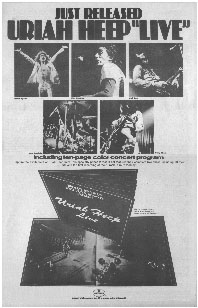![]()
  |

Uriah Heep Live
Uriah Heep
Mercury SRM 2-7503
Released: May 1973
Chart Peak: #37
Weeks Charted: 30
Certified Gold: 10/12/73
Almost every insult that could be heaped on Uriah Heep's heads has been during the last three years, some of the most imaginative being reproduced on the album sleeve to haunt their authors. Plague those writers these reviews might, because Uriah Heep has overcome some of the most virulent critical resistance in rock history to become a major concert and record attraction.
 Click image for larger view. |
Ever since Sixties pioneers proved that loud can be good, a portion of the rock public has assumed that loud is good. Uriah Heep often fails to make that distinction, which is unfortunate, because in less frenzied moments there is evidence that the jovial fivesome is capable of some subtleties. Ken Hensley's organ playing can be sensitive as well as powerful, and David Byron can sing in muted falsetto as well as tortured screams.
This album is Uriah Heep's farewell to Mercury. Perhaps if in their tenure at Warner Brothers they strike a better balance between the tastefully heavy and the clumsily overdone the critical abuse will cease. One prays so. Three years of slagging is more than enough to read about anybody.
- Paul Gambaccini, Rolling Stone, 8/30/73.
Bonus Reviews!
The wheel turneth. The spoken introduction goes: "And now... England's own... Uriah Heep!" Odd to think that there was a time when England dominated the whole scene and American groups couldn't get arrested over there. Nothing good or bad about that, just noticing...
The Heep band is competent at what it does, dispensing high-energy blandness, complete with vague and hackneyed lyrics, to a rapturous audience. I begrudge no band its popularity -- I have some experience of what bands go through and hope for. But Uriah Heep is an example of what a learned friend of mine has pointed out: rock, after Woodstock, was no longer a musical but a social event. This is perhaps the reason why so many bad live albums have been issued in recent years. The rock audience gets the same feeling that radio audiences used to get thirty years ago from remote ballroom broadcasts by the Benny Goodman band or Manhattan Merry-Go-Round ("The latest hits of the day, sung so clearly you can understand every word!").
Heep is a pastiche of electronic gimcracks (Moog synthesizer), rattle-bang drums, and a guitar that is not so much played as it is amplified. The record company has wisely reprinted pro and con reviews on the dust jackets and the records; the final effect is, to quote Danny and the Juniors, "We don't care what the people say/ Rock and roll is here to stay." Yes, it surely is, and we can expect much more music of this type, just as we have had a Godawful amount of competent jazz albums released for the last fifteen years, long after the form had exhausted itself. The difference these days is that the record industry is a two-billion dollar-a-year behemoth which has learned valuable lessons about merchandising in the last half-decade; it understands what the audience wants, as much as an industry can, and dispenses it forthwith.
In the words of Bob and Ray: "This is your bed, you made it, now lie in it." In the words of somebody: "They say this is the Age of the Common Man. Who the hell wants a common man?" Or, for that matter, a band like Uriah Heep?
- Joel Vance, Stereo Review, 10/73.
This double set by this exciting British hard rock band manages to capture all the feelings of a concert. Apparently very little of the overdubbing so common on "live" efforts has been done here, and the band sounds incredibly like their studio disks while still offering the in-person flavor. Highlights are the top vocals of David Byron and the exceptional keyboard work of Ken Hensley. Best cuts: "Easy Livin'," "July Morning," "Medley" (with classic rock such as "At The Hop" and "Blue Suede Shoes.")
- Billboard, 1973.
Uriah Heep may have been a popular concert attraction, but that doesn't necessarily mean their concerts were always entertaining, as the dull Uriah Heep Live proves. * *
- Daevid Jehnzen, The All-Music Guide to Rock, 1995.
![]() Reader's Comments
Reader's Comments
No comments so far, be the first to comment.